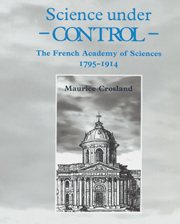Book contents
- Frontmatter
- Contents
- List of tables and figures
- Preface
- List of abbreviations
- INTRODUCTION
- 1 SCIENCE IN FRANCE
- 2 THE STRUCTURE OF THE ACADEMY
- 3 THE FUNCTIONING OF THE ACADEMY: SOME POSSIBLE ROLES
- 4 SCIENCE DIVIDED: THE SECTIONS
- 5 THE ACADEMICIANS
- 6 ELECTIONS: ‘GREEN FEVER’
- 7 REGISTRATION, JUDGEMENT AND REWARD
- 8 THE PRINTED WORD
- 9 AN ACADEMY UNDER GOVERNMENT CONTROL
- 10 ‘OUTSIDERS’: THE SCIENTIFIC FRINGE AND THE PUBLIC
- 11 THE INTERNATIONAL DIMENSION
- 12 THE CONTROL OF THE ACADEMY AND OF SCIENCE
- Name index
- Subject index
5 - THE ACADEMICIANS
Published online by Cambridge University Press: 09 October 2009
- Frontmatter
- Contents
- List of tables and figures
- Preface
- List of abbreviations
- INTRODUCTION
- 1 SCIENCE IN FRANCE
- 2 THE STRUCTURE OF THE ACADEMY
- 3 THE FUNCTIONING OF THE ACADEMY: SOME POSSIBLE ROLES
- 4 SCIENCE DIVIDED: THE SECTIONS
- 5 THE ACADEMICIANS
- 6 ELECTIONS: ‘GREEN FEVER’
- 7 REGISTRATION, JUDGEMENT AND REWARD
- 8 THE PRINTED WORD
- 9 AN ACADEMY UNDER GOVERNMENT CONTROL
- 10 ‘OUTSIDERS’: THE SCIENTIFIC FRINGE AND THE PUBLIC
- 11 THE INTERNATIONAL DIMENSION
- 12 THE CONTROL OF THE ACADEMY AND OF SCIENCE
- Name index
- Subject index
Summary
The Institute of France may be far more truly said to contain the essence of French science than the Royal Society of London can be said to contain that of Britain.
(R. Chenevix, Edinburgh Review, 34 (1820), 411.)For twenty years…I must plead guilty to living only to deserve the approval of the Academy.
(Pasteur, in letter of September 1866, Correspondance, vol. 2, p. 281.)The more academies are justly famous, the greater the wish to belong to them, and the greater the efforts that people make to reach this goal turns to the advantage of science and to the glory of the human spirit.
(Arago, Eloge of L. Carnot (1837), M.A.I., 22 (1850), cxvi–cxvii.)An intellectual elite
There is no doubt that the Academy constituted an intellectual elite. In many ways it was also a social elite but this is a different issue and it is best to deal with each aspect in turn. That members constituted an intellectual elite can be demonstrated in several different ways. We could for example, examine a number of case histories of the careers of Academicians. Of course, the First Class of 1795–6 consisted of a substantial core of men who had been members of the previous Royal Academy. They had come up through the old system of promotion from assistant to associate and finally to pensioner. Most had learned a great deal of their craft, so to speak, by ‘apprenticeship’ as junior members of the Royal Academy.
- Type
- Chapter
- Information
- Science under ControlThe French Academy of Sciences 1795–1914, pp. 167 - 202Publisher: Cambridge University PressPrint publication year: 1992



